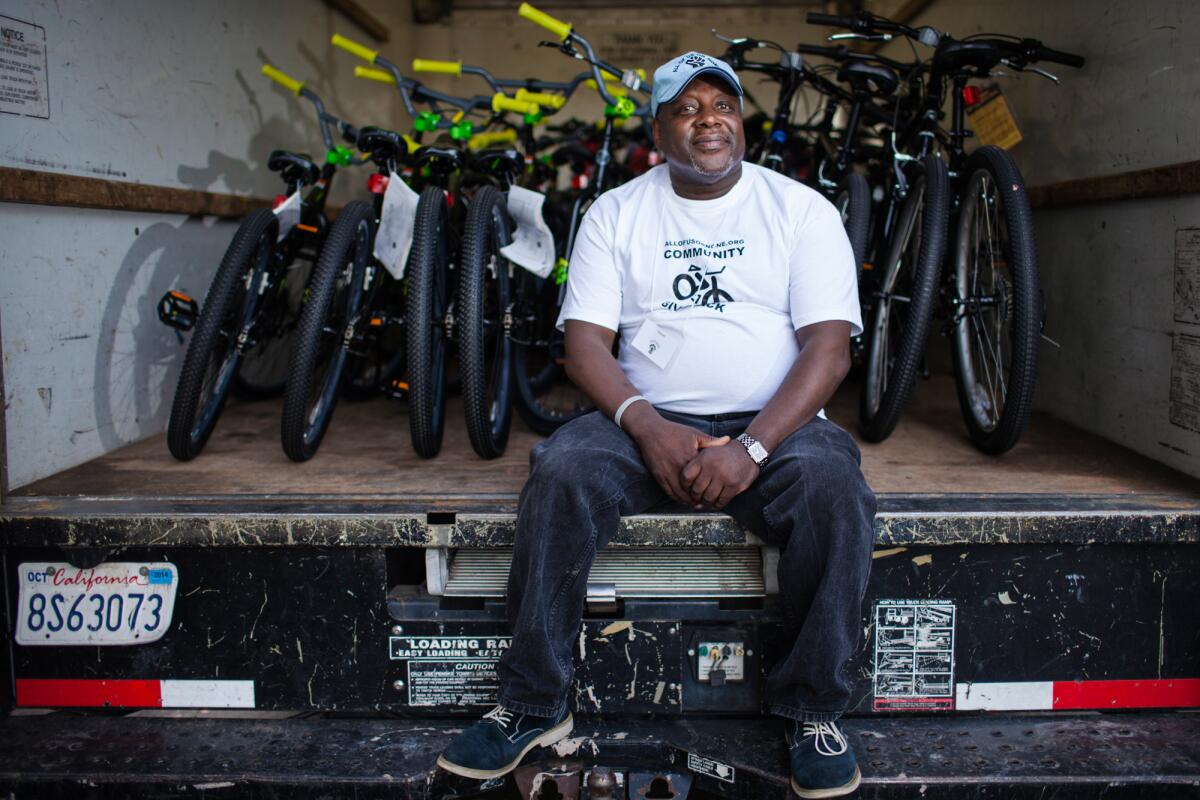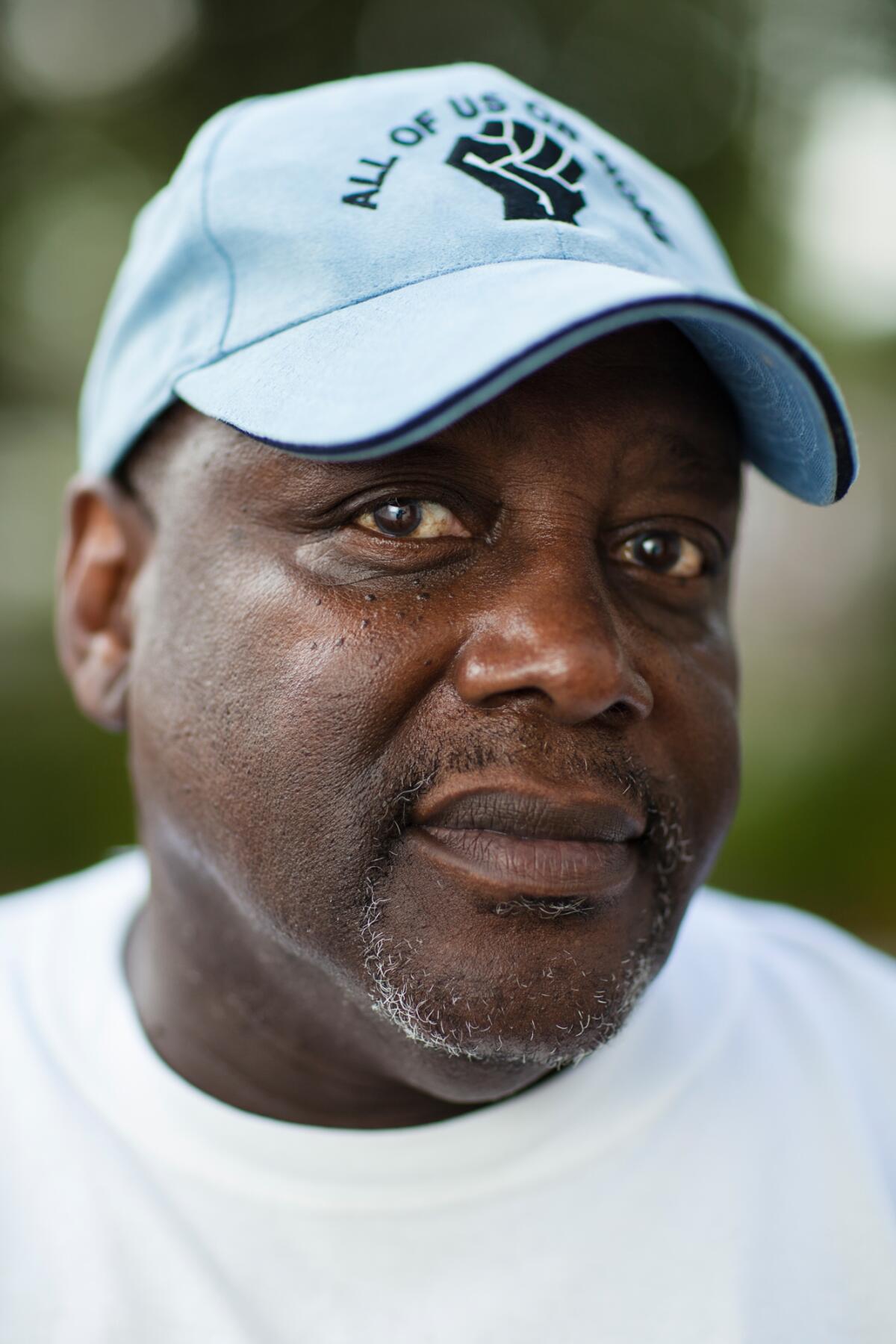He wants to kick Jim Crow out of the California Constitution

- Share via
Dorsey Nunn knows more about one particular line in the California Constitution than anyone would ever want to. It’s the line that harkens back to the dark days after the Civil War, the one that bans slavery — more or less.
“Slavery is prohibited,” says Article 1, Section 6 of the Constitution, the set of fundamental principles that defines what this state stands for. “Involuntary servitude is prohibited except to punish crime.”
The 69-year-old spent a decade behind bars for a 1971 robbery in which his accomplice killed a man. At San Quentin State Prison, he mixed chemicals for detergents that cleaned California’s tunnels and highways and hefted 50-pound sacks for later delivery. Two of his brothers were in prison at the same time.
Today he runs an advocacy group called Legal Services for Prisoners with Children. He has spent decades fighting for the rights of formerly incarcerated people. And, now, he wants to change the constitution.

“I think that some people would be satisfied with changing the names of schools. Some people would be satisfied with showing their disdain by pulling down statues of Confederate heroes,” he said. But what good is that, if “we leave in place direct instruments of law that flow directly from slavery and Jim Crow?”
Nunn is among the reasons Assemblymember Sydney Kamlager (D-Los Angeles) introduced legislation to remove what she views as the last vestiges of slavery from the state Constitution. He’s the reason the San Francisco Board of Supervisors’ public safety committee on Thursday will consider supporting Kamlager’s effort. He’s the reason the Riverside County Board of Supervisors is set to consider the issue in March after putting it on hold twice in February.
“We’re not talking about being soft on crime,” Nunn said. “We’re talking about being just on humanity.”
Colorado voters changed their Constitution in 2018 to ban involuntary servitude in that state’s prisons and jails. Utah and Nebraska did the same in 2020. The Abolish Slavery National Network lists 12 states with similar legislation or ballot measures in progress; activists in 12 other states, Washington, D.C., and Puerto Rico also are organizing around the issue.

Oregon Sen. Jeff Merkley introduced a measure in December to take similar language out of the 13th Amendment to the U.S. Constitution. His joint resolution died when the 116th Congress ended; he plans to reintroduce it in coming months.
“I do think the momentum is here,” said Michele Goodwin, the chancellor’s professor of law at UC Irvine and a constitutional scholar. “I think that in the wake of the [Jan. 6] insurrection, in the wake of [the deadly Unite the Right rally in] Charlottesville, we’re coming to understand how deeply our nation is imbued with racism and white supremacy.”
Not everyone, however, is on board. Riverside County Sheriff Chad Bianco plans to fight local efforts to change the California Constitution. He views Kamlager’s Assembly Constitutional Amendment 3 as a continuation of what he calls the Democratic agenda supporting criminals over victims of crime.
“There is not slavery,” says Bianco, who runs his county’s jails. “Inmates are not slaves. They are convicted criminals serving a sentence for victimizing us. This ACA 3 is just another in a long list of items that shows us that this legislature is anti-public safety and pro-criminal.”
Terry Thornton, spokesperson for the California Department of Corrections and Rehabilitation, declined to comment. “CDCR does not comment on proposed legislation,” she said.
Michele Kane, spokesperson for the California Prison Industry Authority, also demurred. Her agency provides jobs for about 7,000 prisoners at 35 facilities; incarcerated workers build furniture, sew masks, and provide other goods and services mostly to state agencies. “CALPIA does not comment on proposed legislation,” Kane said.
According to the agency’s website, “CALPIA’s job assignments are voluntary — offenders are not required to work; however, offenders are generally eager to participate, as waiting lists are common for many CALPIA assignments. The CALPIA work assignments can help offenders learn work skills and habits to become productive members of society.”
However, a Los Angeles Times investigation found that, as the pandemic raged, the state kept prison factories running, even as rehabilitation programs, educational classes and religious services were canceled to halt the spread of the coronavirus. Interviews with inmates revealed that they were forced to work for pennies an hour under threat of discipline; many became sick.
“I don’t think you can volunteer under gunpoint,” Nunn said. “In the event you do decide to go to CALPIA, they give you a choice between almost nothing and nothing. ... If you quit, sooner or later you’ll get a 115, a rule violation ... At a certain point how do you call that volunteering?”
Kamlager introduced ACA 3 on Dec. 18. If both the Assembly and the state Senate approve the amendment with a two-thirds majority, it will appear on the ballot sometime in 2022. To pass, it must receive 50% plus one vote, according to the California Secretary of State’s office.
Although she has long focused on criminal justice reform, Kamlager said, she had no idea that the state constitution sanctioned involuntary servitude to punish crime until she was approached by Nunn and Jamilia Land, a member of the Abolish Slavery National Network.
“For Black folks, we account for 28% of the prison population and less than 6% of California’s overall population,” Kamlager said in an interview. “We know that the numbers are a little more proportionate but still higher for Latino communities. And we know that many of the folks who are in our prisons who are Black and brown are working essentially for free. ... You can’t talk about racial equity or racial justice without talking about economic justice.”
If the amendment passed, she said, its effects would not be felt immediately. Instead, it would kick off a conversation on reforming the state’s prisons and jails, about the circumstances under which prisoners work and what they are paid. According to the Prison Policy Initiative, California inmates are paid between 8 cents and 37 cents per hour for regular jobs and between 30 cents and 95 cents per hour for jobs in so-called correctional industries. Inmates fighting California’s wildfires earn between $2 and $5 a day plus $1 an hour when on a fire.
Nunn and his colleagues have begun reaching out to elected officials throughout the state to drum up support for changing the Constitution. Riverside County Supervisor V. Manuel Perez introduced his resolution to champion ACA 3 on Feb. 2 — the beginning of Black History Month and the same day San Francisco Supervisor Matt Haney introduce a similar resolution in his county.
“I just think it’s important that we recognize the fact that there’s always been controversy around prison labor,” Perez said in an interview. “It’s got its roots dating back to the Civil War and slavery. ... Although the 13th Amendment was ratified, at the end of the day, there’s that clause that says, ‘except for the punishment of crime.’ I think that’s language that should be eradicated from our Constitution.”
The resolution was pulled on that day and rescheduled for consideration on Feb. 9. Then it was continued for another month for Riverside County officials to analyze its impact on jail programs such as work release and community service.
“Certainly no one supports involuntary servitude per se,” county Chief Executive Jeffrey Van Wagenen Jr. told the board at the time. “We want to make sure there’s no unintended or collateral consequences that would negatively impact any of the successful programs that we have, either statewide or in the county.”
More to Read
Sign up for Essential California
The most important California stories and recommendations in your inbox every morning.
You may occasionally receive promotional content from the Los Angeles Times.











